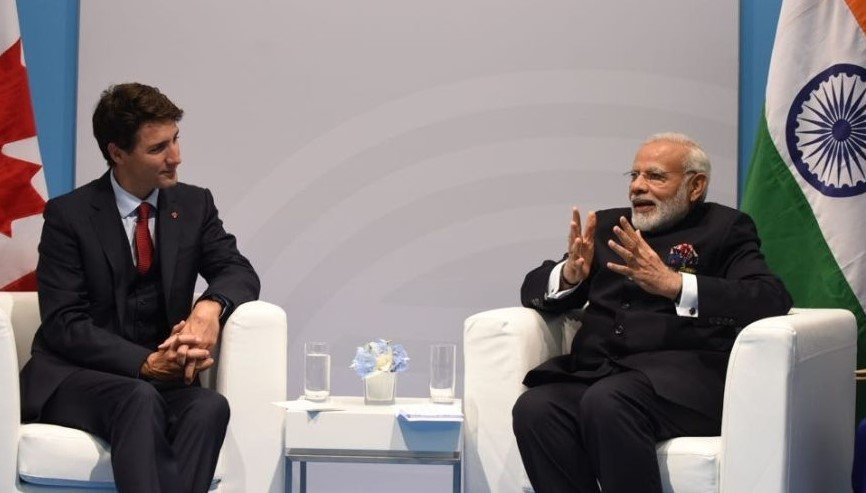Prime Minister Narendra Modi is gearing up for a high-stakes diplomatic mission in Ottawa, where he plans to press Canadian authorities on India’s outstanding requests to extradite Khalistani militants. The talks are expected to take place during the sidelines of the upcoming G7 summit, reflecting the rising tension over security and bilateral relations between the two nations.
As Modi arrives in Canada, the spotlight will be on his outreach efforts, especially concerning the controversial Khalistani separatist issue that has long plagued Indo-Canadian ties. India has repeatedly called on Canada to act decisively against the fugitives sheltering within its borders.
Diplomatic Push in Ottawa Amid G7 Summit Buzz
Prime Minister Modi’s visit to Ottawa is more than just protocol; it’s a strategic move. Canada remains a key player on the global stage, and its relationship with India has significant implications for trade, security, and diaspora dynamics.
Modi’s agenda reportedly includes direct talks with Canadian Prime Minister Justin Trudeau and key officials like Mark Carney, Canada’s special envoy to India. The extradition of Khalistani militants has been a sore spot, with New Delhi accusing Ottawa of dragging its feet. This diplomatic tug-of-war has played out for years, with mounting frustration on India’s side.

It’s worth noting that Khalistani separatists, advocating for an independent Sikh state, have found support in pockets of the Canadian Sikh diaspora. India views this as a serious security threat, linking these groups to violence and terrorism. Hence, the extradition requests carry heavy political weight.
The upcoming G7 summit provides a perfect backdrop for Modi to elevate the issue. Given the presence of world leaders and heightened media attention, Modi is likely to leverage this platform for maximum diplomatic effect.
Canada’s Response and Challenges Ahead
Canada, meanwhile, walks a fine line. On one hand, it values its strong ties with India — economically and culturally. On the other, it must adhere to its own legal system and democratic principles, which complicates extradition processes.
Canadian officials have often highlighted the need for robust evidence before taking action against suspects, emphasizing due process. This stance, while understandable, has been a source of irritation for India, which feels the extradition requests have lingered too long without meaningful progress.
The political sensitivity of the Khalistani issue in Canada cannot be overstated. The Sikh community is a vibrant and influential part of Canada’s multicultural fabric. Any perceived heavy-handedness could ignite domestic backlash, complicating Ottawa’s position.
Despite these hurdles, there are signals that Canada wants to improve cooperation with India on counterterrorism and legal matters. Prime Minister Trudeau’s government has expressed a willingness to work closely, but concrete outcomes remain elusive.
Historical Context and the Stakes for Both Nations
To grasp the depth of this issue, one must rewind to the 1980s and 1990s, when the Khalistan movement peaked in Punjab, India. The violent insurgency left deep scars, prompting a strong response from the Indian government.
Over time, many militants fled abroad, seeking asylum in countries like Canada and the UK. These exiles have become flashpoints in diplomatic relations. India’s calls for extradition are part of a broader effort to bring perpetrators to justice and curb separatist rhetoric internationally.
The stakes are high on multiple fronts: India wants to send a clear message against terrorism, safeguard its internal security, and maintain international pressure on Khalistani sympathizers.
For Canada, balancing its legal obligations with diplomatic goodwill and community sensitivities is no easy task. The challenge is to maintain the trust and goodwill of its Indian diaspora, while also respecting Canadian judicial procedures.
| Key Players | Roles/Influence |
|---|---|
| Narendra Modi | Indian PM pushing extradition agenda |
| Justin Trudeau | Canadian PM balancing diplomacy and domestic concerns |
| Mark Carney | Canadian envoy to India, liaison in talks |
| Khalistani Militants | Extradition targets, linked to separatist violence |
| Sikh Diaspora (Canada) | Influential community affecting political decisions |
India’s push during the G7 summit could well be a turning point. Modi’s engagement with Carney and Trudeau might set the tone for renewed cooperation or deepen existing frictions.
What’s Next for Indo-Canada Relations?
While the extradition topic dominates headlines, it’s part of a larger tapestry. Trade deals, climate change cooperation, and global security challenges also feature on the table.
Modi’s visit is a chance to reset some of the tension and explore new avenues for collaboration. But make no mistake — the Khalistani issue will be front and center. The pressure is on Canada to act decisively, yet cautiously.
Observers will be watching closely how Ottawa responds in the weeks following the summit. Any progress or stall will influence the diplomatic narrative between these two democracies.
In the end, this is about more than just extradition papers. It’s about trust, security, and the future direction of a critical bilateral partnership.
